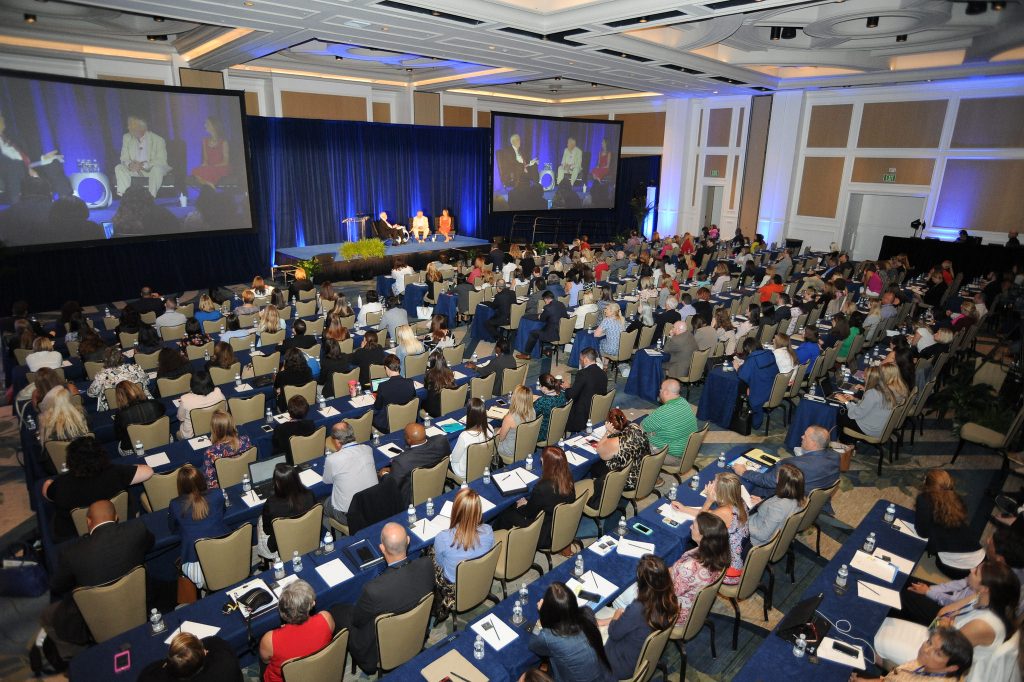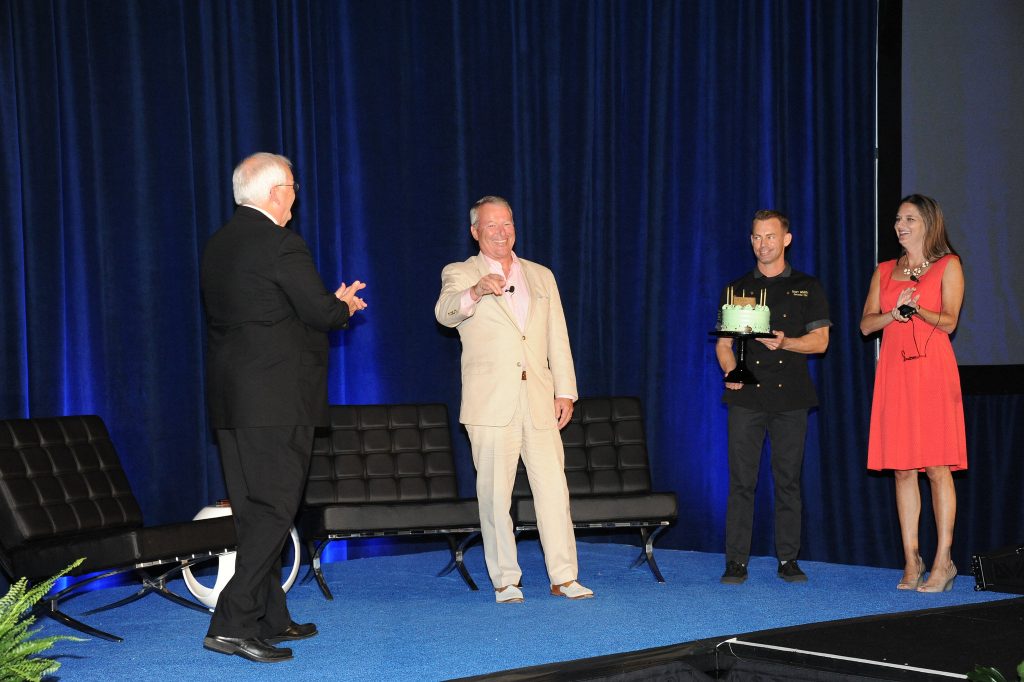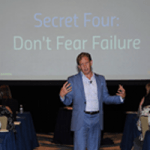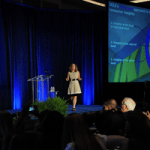Blogger: Susan Vernon-Devlin, Orlando Area Chapter
Tragedy! It’s a defining moment that forever changes the way we communicate. With the Pulse nightclub shooting Orlando joined the list of cities like Paris and Sandy Hook. Mayor Dyer took this tragedy very personally. Roger Pynn, APR, CPRC’s introduction of the Mayor and his Deputy Chief of Staff Heather Fagan was interrupted by an explosive mic squeal leaving us feeling shaken…briefly. It appears that even a year after Pulse we are still all on edge. And so the Fireside Chat began.
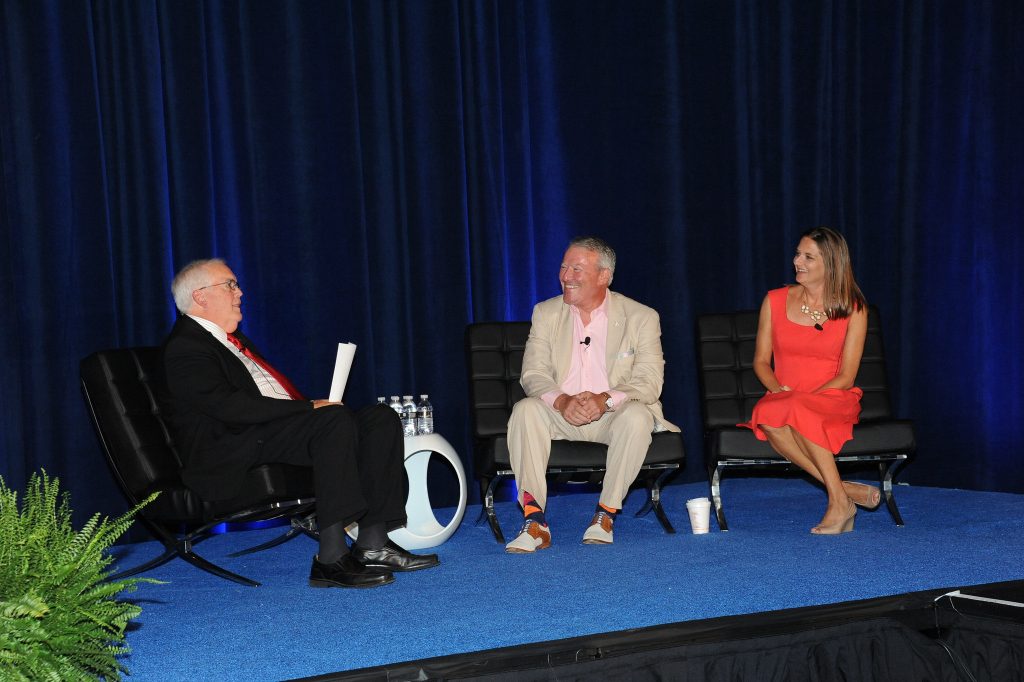
Mayor Dyer: “It’s the call that no mayor, no elected official wants to receive. A little after 2:30 a.m. on Sunday morning June 12, 2016, the call of the Pulse nightclub shooting came. Pulse was a very accepting club anyone could go there to dance.”
Mayor Dyer immediately called Trey his son to see where he was. Trey answered his phone and the Mayor was relieved when his son answered. Mayor second call was to Heather [Fagan]. He gave Heather the extra five minutes to get ready and then the process began
Roger: “How do you work with a powerful political leader?”
Heather Fagan: “If you’re working with a strong leader and you come with a problem, you should also bring the solution.”
Mayor Dyer concurs that he likes to hire very talented people.
Mayor Dyer: “I share the message I want to convey and then I let the team work through the forms of communication they do best.”
That being said, Mayor Dyer has a UCF student tweeting for him.
Mayor Dyer: “You have to know your strengths and weaknesses and one of my weaknesses is anything social media so I bring people in to manage that.”
Roger: “So how did you decide how to manage the situation of communicating about this tragedy. What were your objectives?”
Mayor Dyer: “It’s hard to remember what we knew at the time but on the way to the command center we talked about my role…”
- stay out of the way of the law enforcement response,
- respect the chain of command,
- gather as much information and as much accurate information that you can to deliver it to the public.
Mayor Dyer: “We were part of the decision making but the chief of police, Chief Mina would be the lead. You follow the chain of command. We talked about the type of information we want to convey and how to convey it. The minute the shooter was killed the FBI stated they were in charge because this was an act of terrorism.”
The FBI agent determined that Mayor Dyer would be the first to step out at the press conference.
Mayor Dyer: “We wanted to convey accurate concise information and we wanted to restore calm to the public. Two responses from the community after a mass shooting are fear and anger. We decided we would not be defined by the hate-filled act of this killer; we will respond with love. We didn’t have any issues with Arab Americans or the Muslim community because of that.”
Roger: “What was your role Heather?”
Heather: “Organizing press conferences was primary but we have a strong social media presence and we used graphics. Our goals were reassuring the community, finding out what resources they needed, and being informative.”
The mayor interjects to mention a shots fired training situation two years prior. Part of the social media messaging used for Pulse was formulated during this training.
Heather: “We knew that the police would be the first to convey information on social media because you don’t have time to go through that at 3 o’clock in the morning. The Mayor’s office talked about re-unification, the police talked about safety and security, the mayor delivered the message of love.”
Roger: “Tell us a bit about the community aid in the crisis.”
Mayor Dyer: “The number of agencies, individuals and entities that offered help was innumerable. People came forward to give. Think about the lines stretching around One Blood on Monday and Tuesday.”
Heather: “In terms of messaging all of the law enforcement agencies used what was coming out of OPD. They did not put out their own messages. One voice was used. Pre-planning goes a long way.
Roger: “It was amazing to see how well everything was handled, how calm people reacted, the outpouring of support. JetBlue a sponsor here at conference was very supportive of the families.”
Tell us about the reunification for families and information delivery.
Mayor Dyer: “We had 30-40 different agencies and entities helping 1,000 people with assistance. The tax collector was there because victims needed titles of cars transferred – things you don’t even think about in a tragedy. JetBlue was the airline that gave the most aid with tickets and flights to help the families get to their loved ones.”
Roger: “Looking back a year later, tell us about important lessons learned.”
Heather: “Having plans in place ahead of time and relationships really helped. Build plans that are sizeable and flexible. We had planned that I would be responsible for all messaging and media relations but with a situation of this magnitude we made changes on the fly to streamline the flow of information out to the public. In hindsite, looking back, we probably should have taken the offers for help earlier. When you’re in it you don’t realize how long it will take and how long you’ll be in it so that’s something I would have done differently, taken offers of help sooner as it would have been nice to sleep.”
Roger: “Mayor Dyer, you have a history of keeping strong communicators near you.”
Mayor Dyer: “I’m not sure where I realized that but you need someone to create the message, the vision and the strategy and how to release it. Heather is very strong on that. Its important to understand your leader, boss, teammates, because what serves me is different than what the President wants in a press secretary. I find in my office I like having a delegator. We have ingrained a culture that 95% of the time we have a person who would make the decisions I would. The other 5% of the time they are a risk-taker and then I have their back. I like to have competing ideas and I like to make sure that people will not be upset. I like people who want to be a part of the team contributing to the team and not competing against the team.”
With the interview portion of the Fireside Chat completed it was time for audience Q&A.
Q: …challenges for communicators with other politicians?
Heather: “You could control the small group that was the City and the County. Others we couldn’t. We did not control the press area so some misinformation got out from people who thought it was open mic. Trying to keep everyone on the same page was a challenge. We did brief our City officials but the federal and the state officials, it was hard to keep them on the same page. We focused on community information, not policy. We left that to the politicians who had platforms to promote. The Mayor took no sides on immigration, religion or terrorism.”
Q: Our new [FPRA] state theme is finding your balance, how long did it take you to get back?
Heather: “It is just happening now. There are cycles of information that keep happening. We were focused on communication, public records and then focused on the one-year anniversary. It was really hard we should have accepted the help.”
Q: …mental health assistance?
Mayor Dyer: “An immediate debriefing was held on the Tuesday after the Pulse. We brought in mental health professionals to help staff in the weeks following the Pulse. People called me to ask how I was feeling. At that time, I was not feeling the emotion. I was not feeling sad or the pain. A mental health counselor told me I had blinders on because I was being a leader. We knew we had to nurture and take care of staff.”
Heather: “I was told by a mental health counselor that we would face the strongest emotion leading up to the anniversary and it was so true. When we brought in the counselors the first time people said they couldn’t deal with it as they were still working through the tragedy…”
Q: What did you do to stay consistent with the message and recommendations for us to do the same?
Heather: “Before every press conference we would see the media reporting as we thought about what to report. That’s why we used social media because we could use that as our main tool to correct misinformation. We made sure to correct the misinformation that affected the big stuff like that OPD was not in the club while the incident was happening. They were and we need the public to know that they were working to rescue people, to subdue the shooter… When we have the EOC set up there is a protocol to follow. So we had that set and we stuck to it.”
Q: How did you handle the national and international press?
Heather: “We set up a one point of entry through Cassandra the press secretary. We filtered everything through one person. We determined that our priority was the local media. We focused on national media at the press conferences but we really concentrated on local media and how they were getting the information out that mattered to the community. We gave the national media some one-on-one time but we definitely used the press conference to convey info to them as their main source of information.”
Q: How do you go about building a strategy?
Heather: “Gather all the information that you can, get the Mayor’s perspective, get legal’s perspective, think of your audiences and build a multi-tiered response. Our website was a huge piece of our response. Gather all the perspectives that you can and determine the best route.”
Mayor Dyer: “If your leadership has not given a clear goal you cannot establish a strategy.”
Q: When will we know if there is healing?
Mayor Dyer: “I don’t think we will ever be completely healed; it’s part of the continuum. Part of the silver lining is the community rallied around each other. Each person was affected differently; if your family was one of the victims or you were in the Pulse nightclub or you knew someone who was affected, you will be affected. We will always remember and honor the 49 and we will remember how our community stood up and came together.
Q: We’ve been having a discussion on ethics in communication. What are your thoughts?
Mayor Dyer: “One of the things we always did was to make sure the victims and families were first. In public records one of the things we did was to protect the victims and families. We did not want the families and victims to be further hurt. We sued the media to keep things closed. We were committed to getting clear information out there. The FBI would have wanted it another way but we wanted the community to feel confident in what we were sharing.”
Q: How has this impacted the way you do your job now?
Heather: “We operate now with more community pride. We have a new flag we do more things to engage the community. We look at the strategy but we look more closely at what the community feels.”
Mayor Dyer: “The longevity of the staff helped us know how staff was going to respond to particular situations. If I had been a first term mayor I’m not sure how the response would be, you may have seen something completely different. Heather can finish my sentences.”
Heather has been with the Mayor’s office for 11 years. This has led to the positive relationships that helped communication during the Pulse aftermath and for other issues.
The Fireside Chat was capped off with a cake and celebration of the Mayor’s birthday. Another coming together of the community to show love even as we discussed a tragedy that will color our lives for many years to come.


